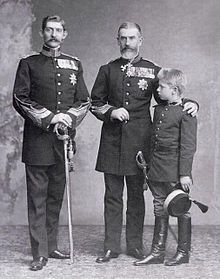Carol I (20 April 1839 – 27 September (O.S.) / 10 October (N.S.) 1914), bornPrince Karl of Hohenzollern-Sigmaringen was the ruler of Romania from 1866 to 1914. He was elected Ruling Prince (Domnitor) of the Romanian United Principalities on 20 April 1866 after the overthrow of Alexandru Ioan Cuza by a palace coup. After the defeat of the Ottoman Empire (1878) in the Russo-Turkish War, he declared Romania a sovereign nation (the country had been under the nominal suzerainty of the Ottoman Empire until then). He was proclaimed King of Romania on 26 March [O.S. 14 March] 1881. He was the first ruler of theHohenzollern-Sigmaringen dynasty, which ruled the country until the proclamation of a republic in 1947.
During his reign, Carol I personally led Romanian troops during the Russo-Turkish War and assumed command of the Russo/Romanian army during thesiege of Plevna. The country achieved full independence from the Ottoman Empire (Treaty of Berlin, 1878) and acquired Southern Dobruja from Bulgaria in 1913. Domestic political life, still dominated by the country's wealthy landowning families organized around the rival Liberal and Conservative parties, was punctuated by two widespread peasant uprisings, in Wallachia (the southern half of the country) in April 1888 and in Moldavia (the northern half) in March 1907.
He married Elisabeth of Wied in Neuwied on 15 November 1869. They only had one daughter, Maria, who died at the age of three.
Carol never produced a male heir, leaving his elder brother Leopold next in line to the throne. In October 1880 Leopold renounced his right of succession in favour of his son William, who in turn surrendered his claim six years later in favour of his younger brother, the future king Ferdinand.
King Carol was reported to be a cold person. He was permanently concerned with the prestige of the dynasty he had founded. His wife, Elizabeth, claimed he 'wore the crown in his sleep'. He was very meticulous and he tried to impose his style upon everyone that surrounded him. Though he was devoted to his job as a Romanian prince and king, he never forgot his German roots.
In 48 years of rule—the longest in Romanian history—he helped Romania gain its independence, he raised its prestige, he helped redress its economy and he established a dynasty. In the Carpathian mountains, he built Peleș Castle, still one of Romania's most visited touristic attractions. The castle was built in German style, as a reminder of the king's origin. After the Russo-Turkish war, Romania gained Dobrogea and Carol ordered the first bridge over the Danube, between Fetești andCernavodă, linking the newly acquired province to the rest of the country.
As a member of the German higher landed aristocracy (Fürst), Carol never managed to follow the much-needed liberal and poor-friendly policies initiated by his predecessor, Alexandru Ioan Cuza. Left unsolved, the grave social problems caused by the inequity of land ownership, ignited peasant uprisings throughout the reign of Carol I. The peasant class was suppressed during 1907 revolt, at the cost of 10,000 lives.[a] [b] Being under the influence of local landlords, the king failed to put together a sound administration, as envisioned by Prince Cuza.
The long rule of Carol helped the quick development of the Romanian state. But, towards the end of his reign and the start of the World War I, Carol wanted to enter the war on the side of the Central Powers. However, Romanian public opinion was overwhelmingly Francophile and sided with the Triple Entente. Carol had signed a secret treaty in 1883 which had linked Romania with the Triple Alliance. Although the treaty was to be activated only if Russia attacked one of the signatories, Carol was convinced that the honourable thing to do was to enter the war supporting the German Empire and his cousin, Emperor William II.[5][6]
On 3 August [O.S. 21 July] 1914, an emergency meeting was held with the Crown Council, where Carol told them about the secret treaty and shared his opinion with them. However, most of the Crown Council members strongly disagreed, opting for neutrality. King Carol died in 10 October [O.S. 27 September] 1914.

 King Carol I of Romania with his nephew (Ferdinand) and grand-nephew (Carol)
King Carol I of Romania with his nephew (Ferdinand) and grand-nephew (Carol)



